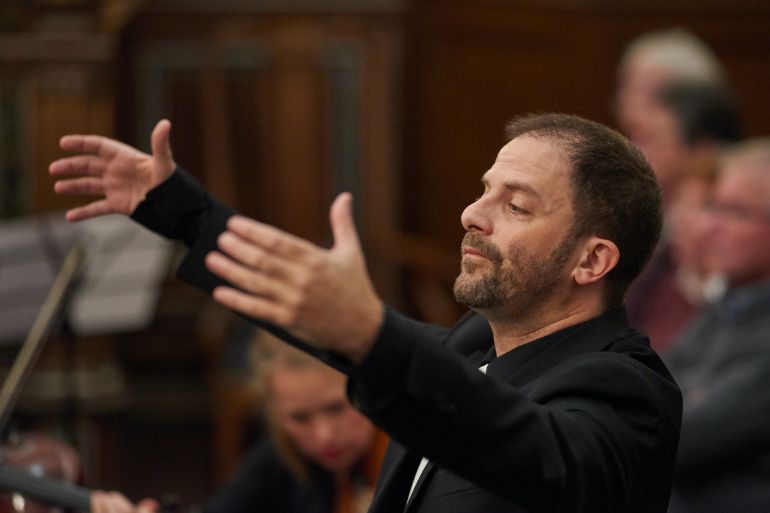‘Not in my name’: The European Jews condemning Israel’s war on Gaza
From Glasgow to London to Barcelona, many Jewish protesters take on abuse to join pro-Palestinian rallies.

When Jonathan Ofir heard the West-led chorus of vehement condemnations of the October 7 Hamas attack on southern Israel, coupled with a flood of statements supporting the country’s right — in effect — to retaliate, he feared he knew what that meant.
“That is, a green light for Israel to carry out a much larger massacre than the one they were revenging,” said the Jewish musician, conductor and writer.
Keep reading
list of 4 itemsPro-Palestine student protests spread in second week of demonstrations
From LA to NY, pro-Palestine college campus protests grow strong in US
‘Left to bleed out’: Israeli forces kill two Palestinians in West Bank
More than 1,400 people were killed in Israel in the Hamas attack, prompting the country’s Prime Minister Benjamin Netanyahu to declare war on the armed Palestinian group. An incessant and brutal bombing campaign by Israel has since killed more than 5,100 people in the Gaza Strip, with large parts of the territory reduced to rubble in just over a fortnight. A Palestinian NGO reported that the Israeli bombing of Gaza had tragically claimed the lives of one Palestinian child every 15 minutes since the start of the conflict.
Ofir, a pro-Palestinian campaigner who was born in Israel but lives in the Danish capital, Copenhagen, is among many Europe-based Jews who are critical of Israel’s policies and have joined protests that have exploded across the continent against the ongoing attacks on Gaza.
From Glasgow to London, Paris to Barcelona, many have joined pro-Palestinian rallies to express solidarity with the people of the blockaded enclave. They represent a vocal minority of Jews that continue to make the case for the rights of a people who have lived under Israeli occupation for generations – the Palestinians – just as they have for decades.
“Israel claims Jews as its national asset, and it weaponises us, as Jews – both as bodies in the demographic battle vis-a-vis non-Jews and particularly Palestinians, and ideologically as born representatives of the Jewish state – [and] seeks to do that to Jews worldwide,” Ofir told Al Jazeera. “That claim, in turn, makes [us] the human shields of the state, as it assaults Palestinians under its settler-colonialist agenda, be it through ongoing ethnic cleansing, through siege or through seasonal massacres.”
Naama Farjoun largely grew up in Jerusalem, but has long described herself as an anti-Zionist Jew. In January 2001, she left Israel, just months after the outbreak of the second Intifada. Today, the 54-year-old lives on the outskirts of Valencia, Spain.
“I left [Israel] because I could not bear the burden of being a privileged [Israeli] citizen in a racist state,” said the mother of two, who said that she was daily angered by the “Israeli occupation and discrimination of my Palestinian co-citizens”.
Farjoun told Al Jazeera that the Hamas attack on Israel brought her “great sorrow … causing suffering no one should endure”. But she added: “I believe the current tragic events are a direct result of years of abuse, repression, violence and deprivation implemented by the State of Israel.”
Jews — including Israeli Jews — voicing their condemnation of Israel’s conduct against the Palestinians is not a new phenomenon. So-called Israeli refuseniks – citizens of Israel who have snubbed its compulsory military service laws in protest of the country’s treatment of the Palestinians – have often served jail time for their principles.
Joseph Abileah, an Austrian-born musician, is widely considered to be the first individual in Israel to stand trial for refusing to serve in the Israeli military, doing so just months after the Jewish state was established in 1948. The violinist managed to escape a prison sentence, and his stance paved the way for generations of Israeli conscientious objectors.
Yet just as Israel’s refuseniks often face backlash for their convictions, so too do pro-Palestinian Jews elsewhere.
It is, said one European resident, rarely easy to publicly support Palestine and condemn Israel as a self-declared Jew.
“When I first started identifying myself as Jewish and supporting Palestinian rights on X [formerly Twitter], the issue in the UK was closely bound up with Corbyn’s leadership of the Labour Party,” said British citizen Tom London, referring to the strident pro-Palestinian convictions of former United Kingdom opposition leader Jeremy Corbyn.
He added to Al Jazeera: “I got plenty of abuse then on X, including describing me as an anti-Semite and saying I was lying about being Jewish. Someone once went through every tweet I had ever sent – but found nothing to help their vile and ridiculous claim that I was an anti-Semite.”
At the time of this writing, a Jewish Voice for Peace petition, calling for an immediate end to the Israeli attack on Gaza, has gathered more than 1,300 signatures from Israeli citizens living in Israel, Palestine and abroad. “As a Jew, and particularly as an Israeli Jew, I feel it is incumbent upon me to say that this is not in my name, and I will fight it as such,” asserted Ofir. “Because freedom, justice and equality for Palestinians is a necessity, and if that necessity doesn’t get sufficed, it is not only harming them, it will come to haunt Jews.”
“We need to … work towards a shared future where we do not harm each other – we need to create a culture of peace. Jewish supremacy will not achieve that.”